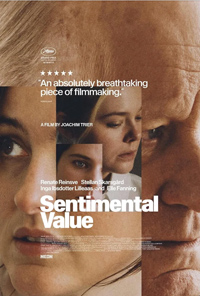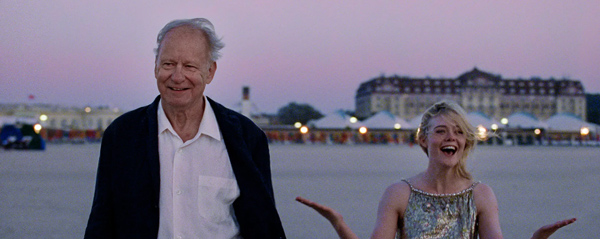Life as a House: Trier Turns Broken Hearts Into Art
 In Woody Allen’s Interiors (1978), an unhappy tale of three sisters contending with their parents’ divorce, Mary Beth Hurt confronts anguished Geraldine Paige, a mother all-consumed with her abandonment. “I feel like we’re in a dream together.” Like Allen, Joachim Trier delivers his own sterling parallels to Ingmar Bergman in his sixth feature, Sentimental Value, which contends with the circuitous reconciliation between a father and daughter through art. Whereas reconnection seems impossible in their reality, cathartic potential arrives through a novel opportunity in artificiality.
In Woody Allen’s Interiors (1978), an unhappy tale of three sisters contending with their parents’ divorce, Mary Beth Hurt confronts anguished Geraldine Paige, a mother all-consumed with her abandonment. “I feel like we’re in a dream together.” Like Allen, Joachim Trier delivers his own sterling parallels to Ingmar Bergman in his sixth feature, Sentimental Value, which contends with the circuitous reconciliation between a father and daughter through art. Whereas reconnection seems impossible in their reality, cathartic potential arrives through a novel opportunity in artificiality.
Nora (Renata Reinsve) is an actor whose career is on the rise, having received praise for her stage work and with a popular television series to her name. After her mother dies, both Nora and her sister Agnes (Inga Ibsdotter Lilleaas) are reunited with their father, famed director Gustav Borg (Stellan Skarsgard), arriving at the wake. Gustav has been largely absent from their lives ever since he divorced their mother when they were children, but Agnes is more forgiving of his nature. Nora wants nothing to do with him, so she balks when he offers her the chance to star in his latest film (his first in fifteen years), which he wrote specifically for her. Nora refuses and time passes. Gustav’s chance meeting with a famous American star, Rachel Kemp (Elle Fanning) reignites the project, which is destined to shoot entirely within Nora’s childhood home while Rachel will be starring as an approximation of herself. Significant changes transpire before production begins.
Bergman was a formidably astute at mining agonizing familiar rifts, and it’s impossible not to compare Skarsgard’s willfully oblivious Gustav Borg to an auteur who also fathered a coterie of children but never reared them. There are shades of Autumn Sonata (1978) or Cries & Whispers (1972), films where imperious, overbearing parents or formidable family estates slowly crush the families living in them. In its opening moments, a narrator announces a thematic device consistently returned to. As a young child, Nora was asked to write an essay imagining she was speaking from the perspective of an object and she chose the family home, where it appears there was considerable discord when her parents were still married. Nora is inextricably associated with the house, the location where her father will shoot the feature he wrote for and about her, apparently with preternatural finesse. All of these elements coalesce and all the colors of the room even out, so to speak, when the characters divorce themselves from the house, and it’s through an artificial rendering of it where true harmony is established.

Much like Maren Ade’s Toni Erdmann (2016), Trier and his collaborating scribe Eskil Vogt mine what appears to have been the spiritual break-up between a father and daughter, each unhappy in their own ways but refusing to acknowledge how similar they are to one another. We first meet Reinsve’s Nora right before curtain call, seemingly having an anxiety attack on her tenuous journey to the stage. There’s a comedic element recalling Trier’s previous film with Reinsve in 2021’s The Worst Person in the World (read review), which became the actor’s international breakthrough. But such energies slowly dissipate as we come to realize Nora is fatally flawed but struggling for her own autonomy. There are heady allusions which can be drawn to Ibsen’s A Doll’s House, the famed heroine Nora breaking from domestic expectations to exert agency and be regarded as something other than a toy. Reinsve’s Nora similarly desires to be more than a title (as a daughter) and an object (an actor), labels her father is trying to extort without first trying to repair their rift.

Two other women figure prominently here, including Inga Ibsdotter Lilleaas as Nora’s younger sister Agnes, and Elle Fanning as Rachel, a famous American actor whose involvement with Borg’s latest feature allows it to be financed. The plot moves beyond Nora’s anguish into a subordinate theme about the necessity of authenticity in art. In other words, Rachel’s involvement demands the film be shot in English, which automatically desecrates the integrity of the project. However, Trier and Vogt play most formidably with the blurring of performance and reality through a repeated monologue. Rachel, increasingly unsure of her appropriateness for the role, acts out a despairing passage from the script, itself a masterful moment where she’s comforted by Gustav’s assistant (the lovely Lena Endre). This monologue provides the impetus for the return of Nora, whose sister begs her to read the dialogue out loud, giving an altogether different interpretation because her rendering is not a performance but speaks to an aspect of her own experience.
Where Sentimental Value tends to feel somewhat overwhelmed is with an extensive amount of running time spent on the fussiness of Borg’s production with Rachel, treating us to publicity (the film is being financed by Netflix), which sometimes bogs down the pace and distracts us from the beating heart of the film.
Various side characters (including Jesper Christensen and Trier’s muse Anders Danielsen Lie) all have amusing moments which highlight the prickliness of both Gustav and Nora, but there remains a sense of conciseness being obscured. And what is the worth of ‘sentimental value?’ As the film itself asserts, the objects with which we apply and maintain because of this feeling sometimes hold us back in a past where both nostalgia and resentment breed supremely. Perhaps it is only through our letting go of such objects, of both literal and hypothetical baggage, we can evolve.
To reference Allen’s Interiors again (which, interestingly stars Diane Keaton as a woman named Renata), where Mary Beth Hurt spills anguish about a beautifully manicured family home, “There wasn’t any room for any feelings.” Because reality exists within us, not in houses or rooms, and allows us to be realistic even in whatever slippery slope of performance we’re each of us navigating.
Reviewed on May 21st at the 2025 Cannes Film Festival (78th edition) – Competition. 135 Mins.
★★★½/☆☆☆☆☆


